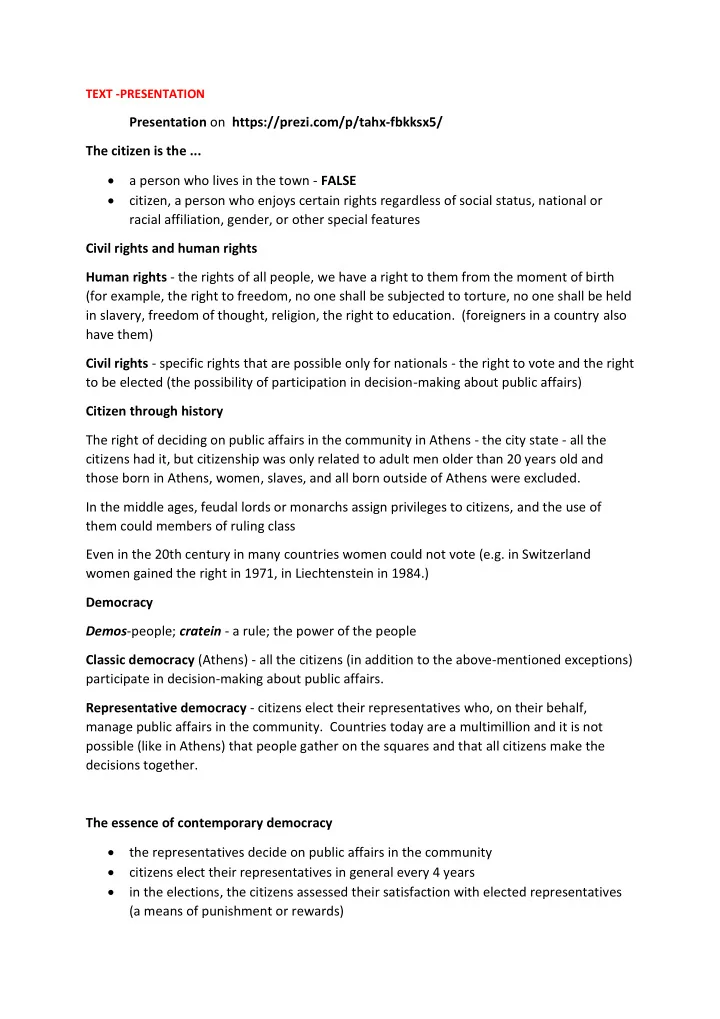

TEXT -PRESENTATION Presentation on https://prezi.com/p/tahx-fbkksx5/ The citizen is the ... a person who lives in the town - FALSE citizen, a person who enjoys certain rights regardless of social status, national or racial affiliation, gender, or other special features Civil rights and human rights Human rights - the rights of all people, we have a right to them from the moment of birth (for example, the right to freedom, no one shall be subjected to torture, no one shall be held in slavery, freedom of thought, religion, the right to education. (foreigners in a country also have them) Civil rights - specific rights that are possible only for nationals - the right to vote and the right to be elected (the possibility of participation in decision-making about public affairs) Citizen through history The right of deciding on public affairs in the community in Athens - the city state - all the citizens had it, but citizenship was only related to adult men older than 20 years old and those born in Athens, women, slaves, and all born outside of Athens were excluded. In the middle ages, feudal lords or monarchs assign privileges to citizens, and the use of them could members of ruling class Even in the 20th century in many countries women could not vote (e.g. in Switzerland women gained the right in 1971, in Liechtenstein in 1984.) Democracy Demos -people; cratein - a rule; the power of the people Classic democracy (Athens) - all the citizens (in addition to the above-mentioned exceptions) participate in decision-making about public affairs. Representative democracy - citizens elect their representatives who, on their behalf, manage public affairs in the community. Countries today are a multimillion and it is not possible (like in Athens) that people gather on the squares and that all citizens make the decisions together. The essence of contemporary democracy the representatives decide on public affairs in the community citizens elect their representatives in general every 4 years in the elections, the citizens assessed their satisfaction with elected representatives (a means of punishment or rewards)
elections - the most important form of civic participation, the control of authorities democratic systems do not imply passivity and submission to the already critical reflection and participating that's why participation in the elections isn ’ t the only role of citizens The referendum and the citizens ' initiative as a way of participation The referendum - the form of direct democracy; using voting citizens directly decide on an issue, the decision of the majority is then executed The citizens ' initiative- citizens strive to point out certain social and political problems that representative bodies need to solve It is possible to act through the organizations of civil society Within the civil society there is a division of the formal and informal means Formal means of civil society - associations, foundations, trade unions, employer organizations, religious communities Informal means of civil society - civil initiatives - groups of citizens who have teamed up for some specific questions or problems, act without legal (e.g. statute) and financial definition Other features of the citizens ' participation activities aimed at public awareness and build the capacity for civic activism (teaching for civic activism through conferences, workshops, cultural and artistic manifestations) volunteering taking active role in the parties participation in electoral campaigns campaigns and advocacy towards decision-makers and public opinion participation in public discussions about the laws, resistance and civil disobedience (petitions, protests, strike) Specific forms of participation of young people Student Council Youth Council - form of the self-organization of young people on a voluntary basis through different organizations of the youth and for young people at the local (city, County) level. Youth Parliament - non-governmental organizations or projects of non-governmental organizations, schools or local authorities, the main purpose of them is to educate young
people about the democratic citizenship and increase the level of their participation in society through membership in the bodies constituted on the model of the Parliament Examples of successful activism Informal civic initiatives: Croatian high school students in 2008. delayed the state's graduation by protests Residents of the Zagreb ’ s neighborhood Savica, managed to fight not to build a church on place of their park (written petitions, staged demonstrations). The children of Tesla street in Kr iževci in 2007 managed to keep their playground by protesting By petition of 450 signatures, parents of children from kindergarten 2006 Špansko managed to start construction of a new kindergarten in their neighborhood Students from Jajce (Bosnia and Herzegovina) were able to manage not to build a special school for the children of other Nations (Bosnians). Instead, they wanted that everyone goes to the same school - Bosnians and Croats. Methods: The Council of students wrote press releases to the media, politicians, and as well they protested. Students Irvington schools in Portland , fought out for a different dress code policy High-school students of medical school from Slavonski Brod strike fought to change practical work in the hospital after they finish school in the afternoon High school students from Labin fought out by protesting for their own safety in the school. At their school the ceiling fell down twice, and the students protested and conveyed that they do not want to attend classes in dangerous classrooms. After protests the ceilings were repaired. An example of activism of the Civil Association - GOOD initiative – an example of a campaign of advocacy- GOOD initiative (bringing together the 50 or so civil society organizations engaged in informal education and human rights. From 2008. years are brought together by at the initiative, which is committed to the systematic and well the introduction of education for human rights and democratic citizenship in the educational system (GOOD Initiative). - CENTRE FOR PEACE STUDIES - an example of capacity building for civic activism The peace study CMS's one-year educational program for citizens who want to work on the social change of the
https://prezi.com/p/-ynhbvl-meyp/
Recommend
More recommend